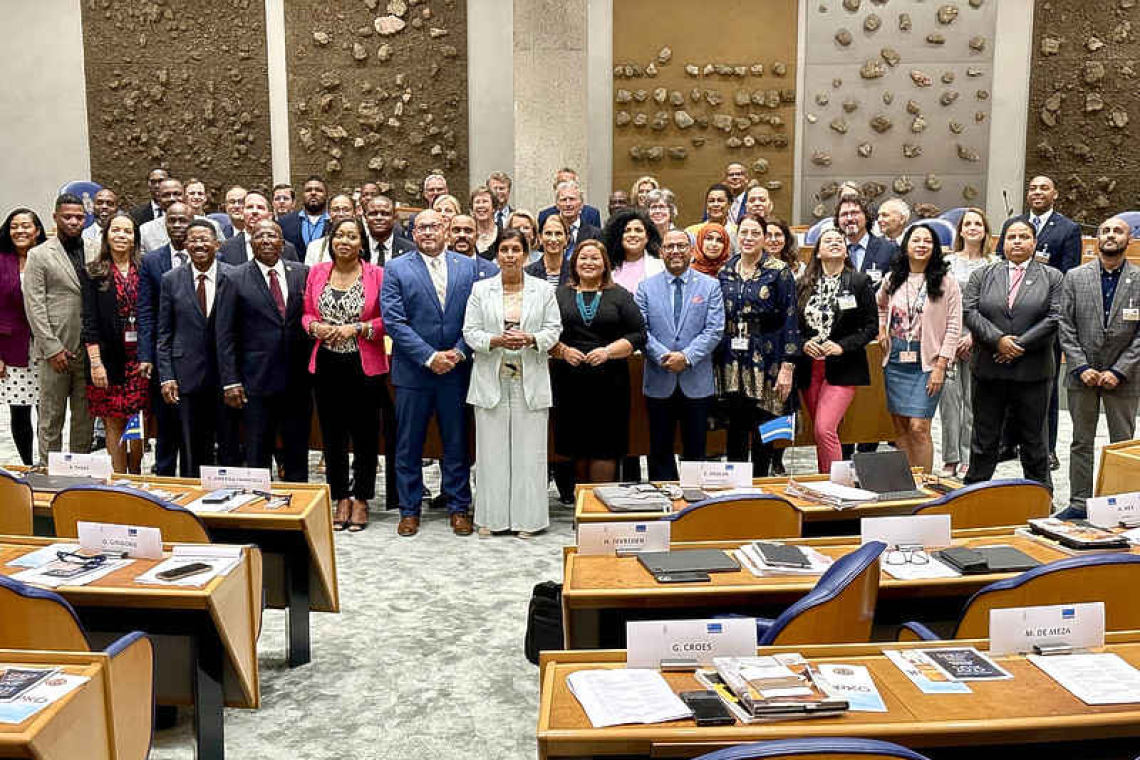Group photo in the plenary hall of the Dutch Second Chamber of Parliament of the four Parliaments participating at the June 1-5 IPKO in The Hague. (Suzanne Koelega photo)
THE HAGUE--The Parliaments of Aruba, Curaçao and St. Maarten indicated during the Inter-Parliamentary Consultation of the Kingdom IPKO meeting in The Hague on Friday, that they await a concrete discussion on how to give content to the slavery past and the continued effects thereof on the people.
Delegations considered the plan to build a national slavery museum in the Netherlands a good initiative, but they did ask how content would be given to the Dutch Caribbean aspect of the slavery past, what would be the focus, and how the issue of the inequality between the Netherlands and the Caribbean part of the Kingdom would be dealt with.
Quartermasters of the new National Slavery Museum John Leerdam and Peggy Brandon gave an explanation about the preparations for the museum in Amsterdam, which should be ready in 2028 or 2029, and answered the many questions by the Members of Parliament (MPs) of the four countries, who on Friday were seated on the benches of the plenary hall of the Dutch Second Chamber of Parliament.
“Normally, you organise an exhibition or you build a museum for a collection of objects. In this museum, the story will be the central factor,” said Brandon, who together with Leerdam, visited all islands to talk with people about their wishes and expectations. “We want to hear what people want to see in the museum and how they want to be represented in the museum,” said Leerdam.
The MPs were in principle positive, but there were some concerns about the involvement of the islands. “How about the inhabitants, the descendants of the enslaved? They cannot go to Amsterdam to the slavery museum. It is important to strengthen the local museums,” said MP Roderick Hoek of the MEP party in Aruba. Dutch Senator Paul Rosenmöller of the green left party GroenLinks asked about the possibility of setting up branches of the slavery museum on the islands.
MPs Giselle Mc William of the MAN party in Curaçao, Marisol Lopez-Tromp of the MAS party in Aruba and Shainily Tromp-Lee (MEP, Aruba) sought attention for education. “We need the means to bring our education to a certain level. That is the only way to secure lasting attention for the slavery past,” said Mc William.
MPs Rolando Brison of St. Maarten’s UP party and Sheldry Osepa of the PNP party in Curaçao asked about the content of the National Slavery Museum. Osepa wanted to know whether there would be special attention for heroes from the times of slavery, people like Tula.
Brison asked if there would be a role for slave owners. “Philipsburg was named after a man who earned a lot from the slave trade. And there is an alley in Philipsburg named after a governor during slavery times, Van Romondt. What will be the role of these figures?” Leerdam and Brandon responded that there would certainly be attention for education, for example in the form of a digital programme with information in Dutch, Papiamento and English. The National Slavery Museum will explicitly collaborate with local museums, such as the Tula Museum at the Knip Plantation House in Curaçao.
Resistance heroes and freedom fighters from all islands will play a central role in the National Slavery Museum. So, not the slave owners, Leerdam and Brandon emphasised. “It will not be a museum of a Eurocentric nature with space for this type of people,” said Brandon.
Friday’s debate was also used for a broader discussion on the slavery past and the lingering effects of this part of shared history. MP Miguel Mansur of the Accion 21 party in Aruba noted that San Nicolas residents, who are predominantly Black, have fewer opportunities than people in other parts of Aruba.
MP Tromp-Lee of Aruba mentioned the relationship with the Netherlands and the fact that The Hague imposes decisions on the islands, such as the Kingdom Law for Financial Supervision or tying the finding of a solution for the ENNIA situation to a more attractive interest rate for refinanced loans. “We can see that as the continued effects of slavery,” she said.
Independent MP Christophe Emmanuel of St. Maarten minced no words in criticising the Netherlands for its slavery past. “Slavery is a crime. This was admitted and apologies were issued. Committing a crime has consequences. If you commit a murder, then you have to go to jail. Then it is not enough to every year put flowers on the victim’s grave,” he said, referring to the annual placing of wreaths at the slavery monument in Amsterdam on Emancipation Day, July 1.







